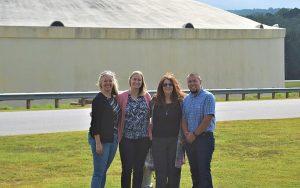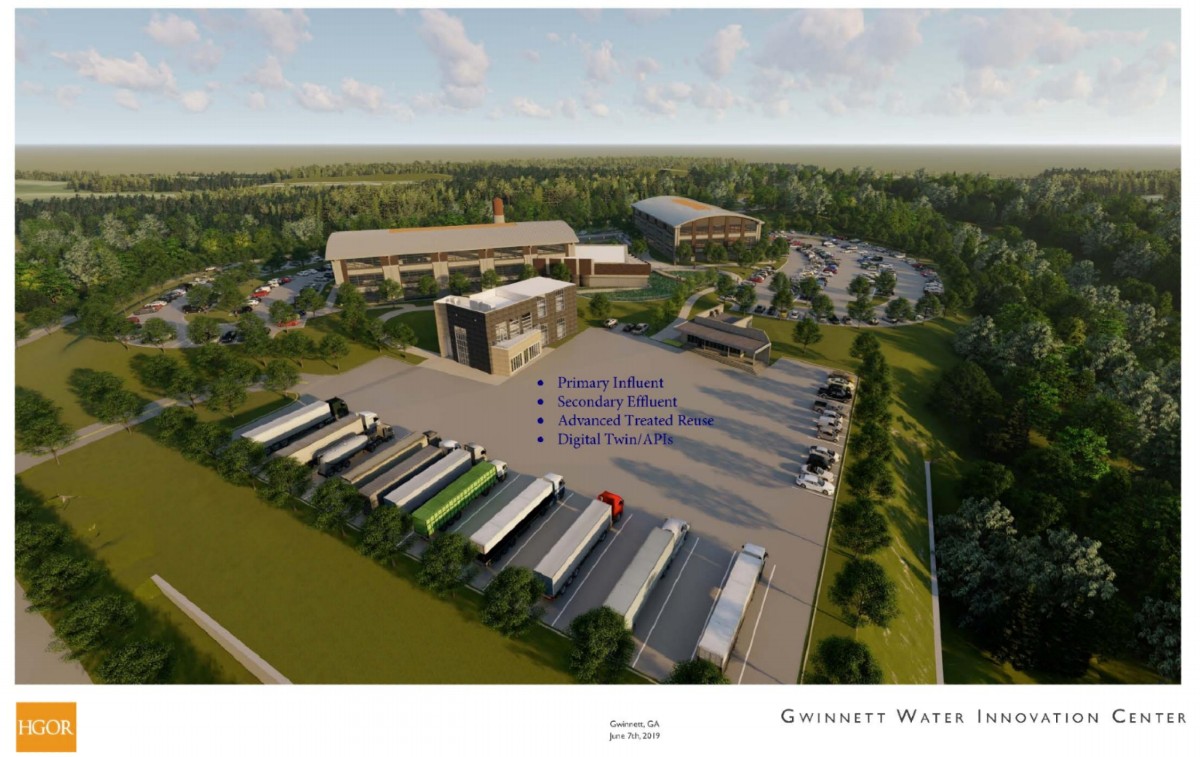By Elliott Brack
Editor and Publisher, GwinnettForum
MARCH 17, 2020 | Even before Gwinnett’s F. Wayne Hill Water Reclamation Plant was finished, it attracted water professionals worldwide to visit the plant. Gwinnett was aiming to treat sewage at a higher standard than anyone in the world, plus returning treated water to Lake Lanier at a higher quality than when the water came from the lake.
 Now Gwinnett’s Water Department is seeking to duplicate for clean water what it did for wastewater. On Tuesday the County Commission will award a contract for The Water Tower, the first (of four) planned buildings, on land adjacent to the Hill Plant, to set a new standard for water utilities worldwide.
Now Gwinnett’s Water Department is seeking to duplicate for clean water what it did for wastewater. On Tuesday the County Commission will award a contract for The Water Tower, the first (of four) planned buildings, on land adjacent to the Hill Plant, to set a new standard for water utilities worldwide.
In September, 2019, Gwinnett’s Water Department came up with the concept for an innovation center for the study of challenges facing water utilities worldwide. It estimated that it would cost $60 million to do so. And it hired an expert in the field, Melissa Meeker, who had been chief executive officer of The Water Environment and Reuse Foundation in Washington, D.C.

From left are the four Water Tower employees: Melissa Meeker, CEO; Kristan VandenHeuvel, strategic director of Research and Engagement; Peggy Alexander, office manager; and Chad Wilbanks, strategic director of Training and Demonstrations.
She also served as executive director of the South Florida Water Management District and deputy secretary of the Florida Department of Environmental Protection, with responsibility for overseeing statewide water and environmental restoration policy, including Everglades restoration. Meeker is a Florida native and has a BS in Biology and a MS in Environmental Resource Management.
Once in Gwinnett, Meeker started asking questions about the idea she had been hired to do….and found little had been done. Her newly-assembled team produced a Business Plan. Lo and behold, what had been estimated to cost $60 million, they found could be done for an estimated under $30 million. So, from the start, she’s already paid for herself! The project anticipates it will be self-sustaining, not costing Gwinnett water customers.
Tyler Richards, head of the Gwinnett Water Department, said of attracting Meeker to Gwinnett: “Once Melissa visited Gwinnett County, heard about the mission and value of the Water Tower and saw the incredible interest and support from the County, the business community and educational institutions, she was fully on-board and we attracted her.”
Here are the four components of the plan:
- Applied Research: Real world application and test conditions in a world class facility, with strategic and collaborative partnerships.
- Technology Innovation: Establish a model for technology demonstration in real time using actual process flows to vet performance of innovated equipment and processes.
- Workforce Development: In-the-field speciality water industry training to develop a career pipeline through recruitment, using internships and apprenticeships.
- Community Engagement: Become a beacon and forum for the public to connect and understand the value of water, through outreach events, securing funding for priorities and networking opportunities.
Already, engineering firms, water utilities and other companies connected with water in any way are joining in public-private partnerships to see The Water Tower succeed. Meeker adds: “We want to make this a research and training ground for innovation in all sorts of ways. Technical firms can use our plant for research and real-time demonstration and evaluation of their new equipment.”
Part of the goal of The Water Tower is to train students in internships so that they can step into good paying jobs in the industry at all levels, something technical firms and colleges will employ at the facility. Meeker says: “We want to offer space for working from the GED level to the PhD.”
Chairman Charlotte Nash says of the project: “The Water Tower at Gwinnett has the potential to change the future of water use not just in Gwinnett, but around the globe. The Water Tower will be a unique combination of policy forum, research facilities, business incubator, and public education venue, all focused on water management. One of the strengths of the Water Tower’s approach is that it will bring together policy makers, academic leaders, practitioners, business, and the general public to address the critical issue of ensuring clean water for the future.”
“The Gwinnett standard,” as Chairman Nash stressed in her State of the County speech, is adding a new dimension, this time in the world, in the production of safe water.
- Have a comment? Send to: elliott@brack.net










Follow Us